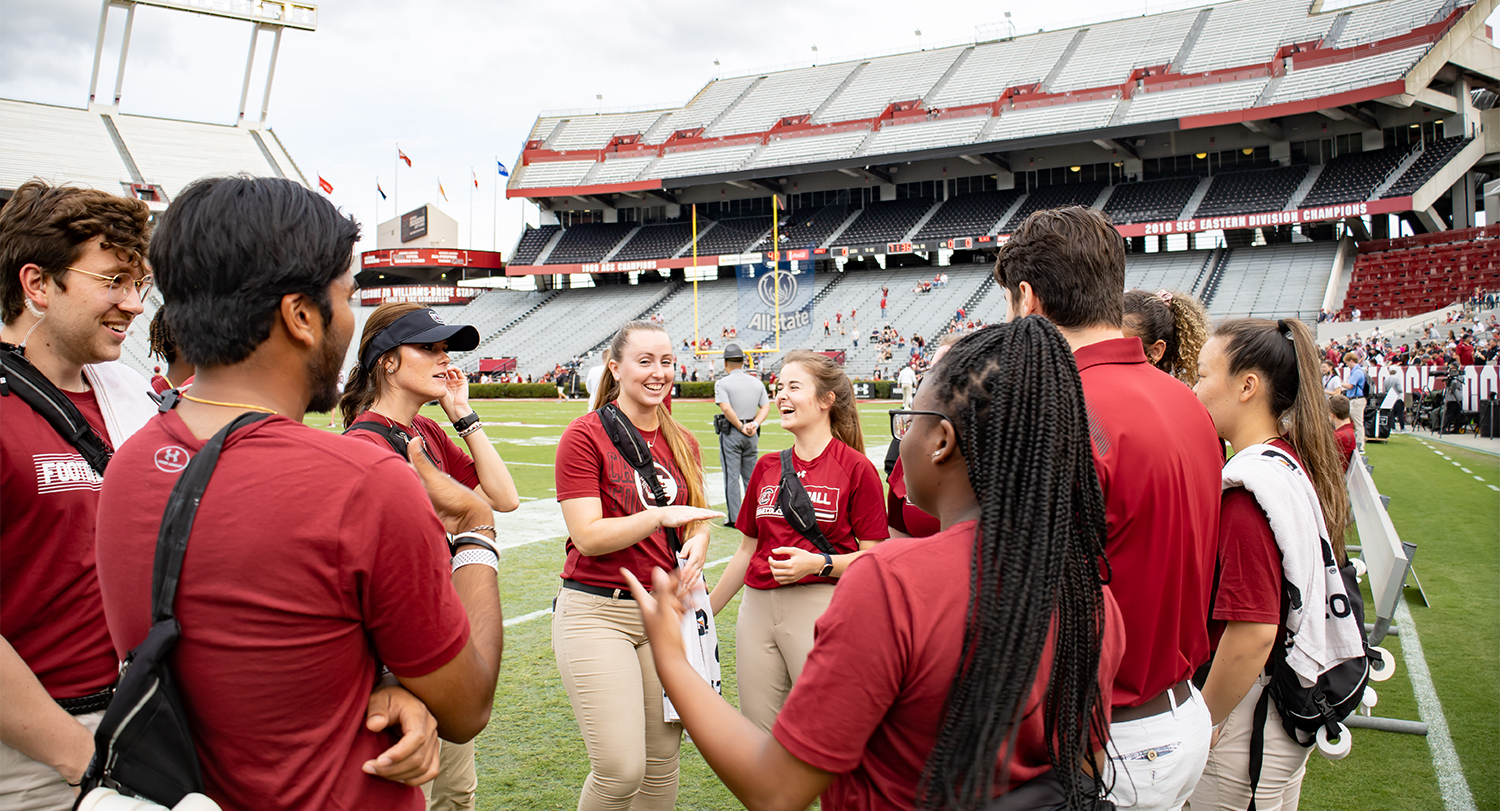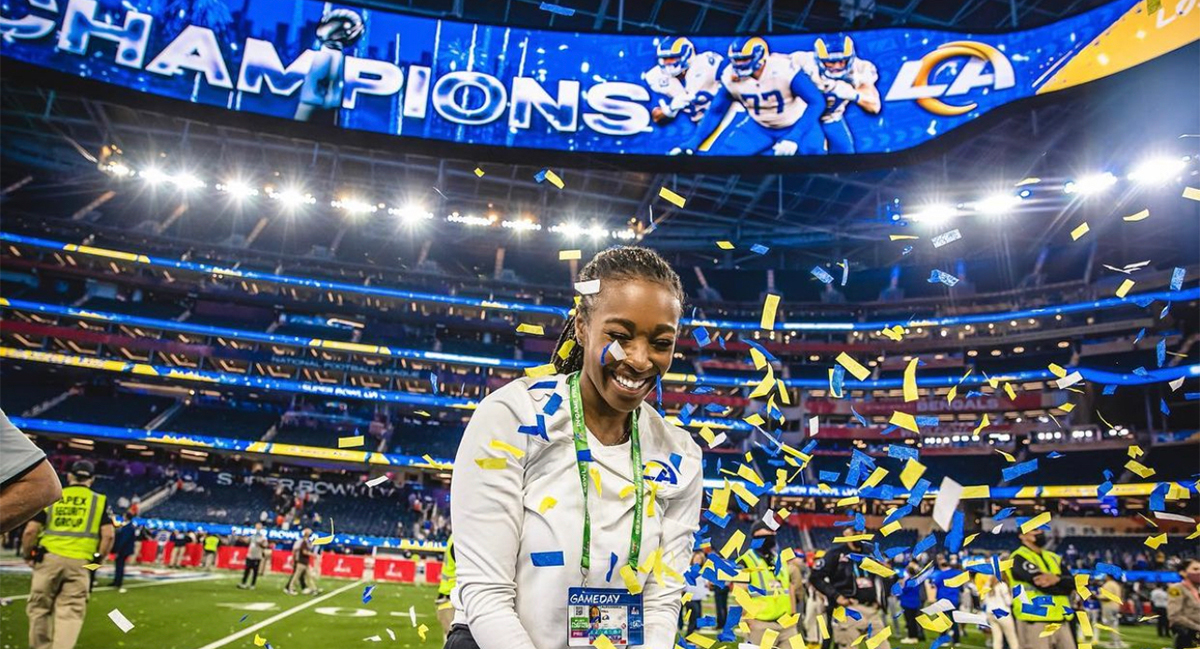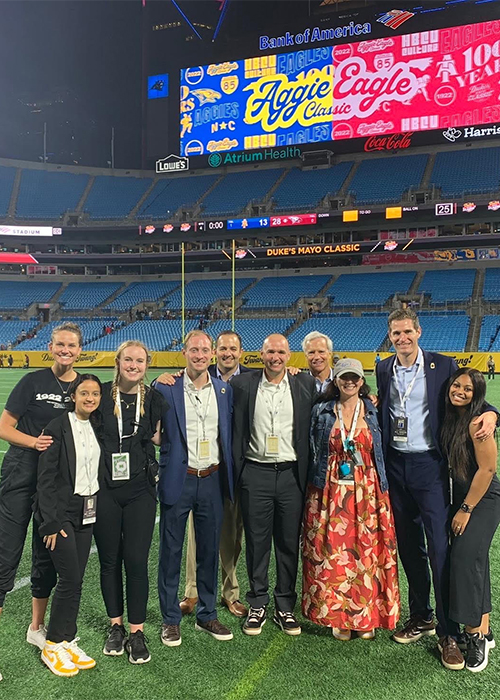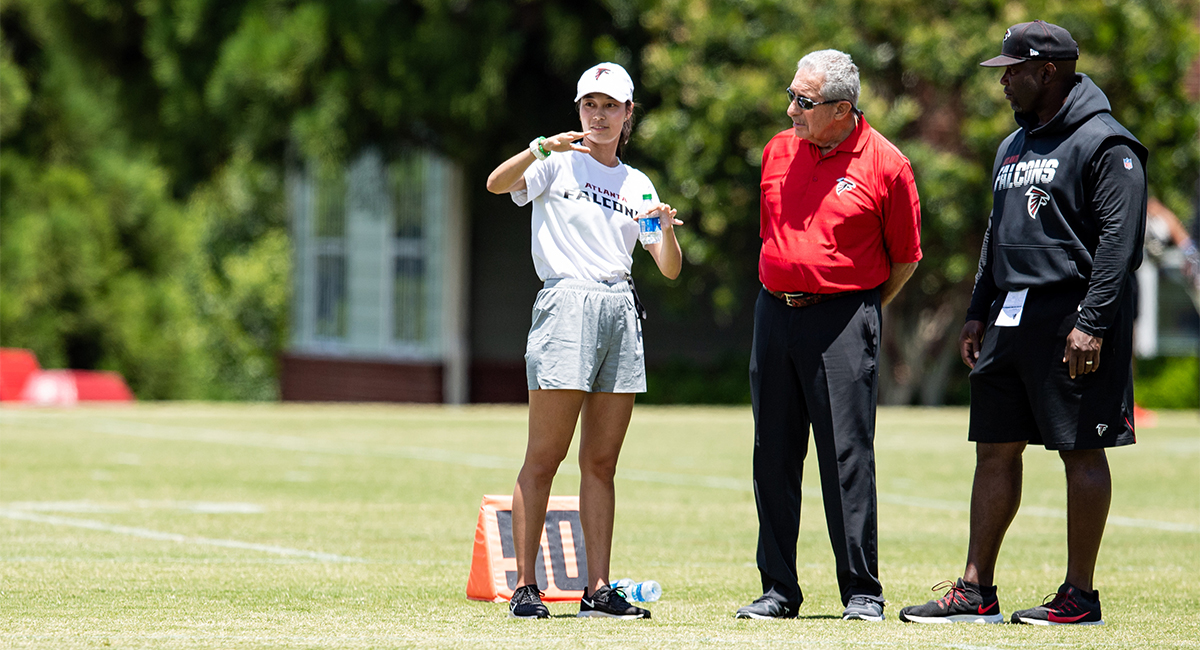
Football is the most popular sport in the United States by far, and there is no better place to launch a career in the business side of the game than the University of South Carolina’s College of Hospitality, Retail and Sport Management. The college’s Department of Sport and Entertainment Management is recognized as one of the best and biggest programs of its kind, and the combination of cutting-edge academics, industry connections and top-tier faculty has created a first-class training ground for football industry leaders.
“I said, ‘Hey, I know I’m not going to go to college to play sports, but I definitely want to work in sports.’ I did my research and found out that South Carolina had a sport and entertainment management program that was very highly ranked. It turned out to be the best decision I made in my life,” says alumnus Aaron Henderson, now an agent representing several NFL players.
The football industry is an economic powerhouse which continues to grow by leaps and bounds. The NFL’s teams are worth 14% more in 2022 than 2021, an average value of $3.48 billion per team. The league is on track to meet its goal of $25 billion in annual revenue by 2027.
Football’s dominance in the business of sport is not limited to the pros. College football generated a record revenue of $1.16 billion in 2021 and is the second most popular sport in the U.S. based on attendance and viewership, surpassing Major League Baseball and college and NBA basketball.
Graduates from the university’s sport and entertainment management degree programs are employed by more than half of the NFL’s 32 teams and the league's home office – with leadership roles ranging from scouting to team operations to ticket sales and marketing. Alumni also hold college football management positions across the country (with many staying at their alma mater to work with the Gamecocks).
“It goes back to the combination of theory and practice. That’s what our college is built on,” says Department of Sport and Entertainment Management Chair Matt Brown. “Our students are able to be competitive in the dream-job market because they are learning from top faculty and gaining real-world experiences that prepare them for the intensity of working in football.”

Inside the classroom, students are learning in specialized courses like gameday operations, sport marketing and venue management from a combination of faculty who are world-class researchers and who have served as team presidents and athletic directors. Outside the classroom students are learning by doing – helping to run SEC college football games, bowl games, the College Football Playoff and the biggest of all U.S. sporting events, the Super Bowl. And with every undergraduate student required to complete two internships, lessons are quickly put into practice.
“What put me at an advantage over other candidates in my hiring class out of college was the experience I was fortunate enough to gain through the internship requirements of the sport and entertainment management program,” says alumna Maddie Ballengee, who now works as assistant merchandise director with Legends Hospitality at AT&T Stadium (home of the Dallas Cowboys). “Our field is very hands on and having experience under two major sports organizations before I even graduated put me ten steps ahead when transitioning into my career in the sports industry. I also appreciated the fact that many of my professors built our course work around very relevant, industry related events and scenarios.”
The Department of Sport and Entertainment Management’s faculty members are leaders in sport research, with specialized centers and scholars dedicated to college sport, ticketing, sport law, fan experience, sport gambling, economic impact, sustainable business operations and more. While the research spans the spectrum of sports and entertainment, football is often the focal point. For example, Associate Professor Tom Regan has conducted more than 80 economic impact studies for organizations including the Denver Broncos and Carolina Panthers, as well as Gamecocks football.

Having faculty leading the way in research shapes the lessons in the classrooms. Professors infuse the curriculum with the latest findings as well as integrating current events happening in real time. If a topic related to the business side of football is in the news, it is also being discussed and debated on campus in Columbia, often by industry leaders.
The Department of Sport and Entertainment Management’s reputation for education excellence has attracted a roster of uniquely experienced faculty and industry partners. Former Carolina Panthers President and current Charlotte Sports Foundation Executive Director Danny Morrison joined the faculty in 2017.
“It was an easy decision to choose South Carolina,” says Morrison, who is now a professor of practice teaching master’s level sport management courses. “I was always impressed by the caliber of students from the program who came to work for the Panthers, and the faculty and quality of work they are doing is excellent.”
The program’s reputation also contributed to the decision by David and Nicole Tepper, owners of the Panthers, to create the Tepper Scholars program at South Carolina in 2020. The prestigious scholarship and career development program is designed to attract the best and brightest sport and entertainment management students with an emphasis on supporting underrepresented students.
Increasing diversity and inclusion in the field of sport management has been a focus for the program. In addition to several specialized scholarships, student clubs and mentorship opportunities for underrepresented students, it is continually opening doors for anyone willing to work hard to earn a career in football, including those for whom the doors were once closed.
“How many Asians do you see in football? I didn’t have anyone who looked like me in the NFL growing up, so I hope that one day, there’s a little Asian girl or boy who sees me and says, ‘I want to be like KJ, she’s my role model,’” says 2020 sport and entertainment management master’s program alumna Kjahna O, now scouting coordinator for the Atlanta Falcons.

Kjahna O graduated from UofSC with her master's degree in sport and entertainment management and is now a scouting coordinator for the Atlanta Falcons.
A key component to creating career opportunities for an ever-growing and diverse student population is tapping into the full range of football-related careers. As part of South Carolina’s College of Hospitality, Retail and Sport Management, the sport and entertainment management program has powerful synergy with areas of study in hospitality, tourism and retail management – and that synergy is on full display on any given gameday. Alumni from across the college’s majors have found open doors to football-related career success with venues, teams, leagues and companies like Fanatics, ESPN, DraftKings, Learfield, CSC, Under Armour, Legends Hospitality and more.
Alumnus Brandon Ruth is director of operations for the Falcons. Gabriela Beavers is manager of club marketing at the NFL league office. Catherine Saulino is associate buyer for NFL women’s and kids’ apparel for Fanatics. The job titles are diverse and range from ticket and sponsorship sales to community relations, business analytics, merchandising, catering, equipment management, and more.
“What put me at an advantage over other candidates in my hiring class out of college was the experience I was fortunate enough to gain through the internship requirements of the sport and entertainment management program.”
"HRSM helped launch my career in a way I didn’t really expect,” says alumnus Glen Ivol who found his niche in business analytics, now with the New York Jets. “Connecting with the faculty helped me learn that no one’s path will be the same - you just have to focus on finding the right fit to help you grow and not be afraid to take a leap of faith."
While the career paths are diverse and the teams often rivals, the South Carolina alumni who are working in the business of football all share a common passion for sport business. And when passion and preparation meet opportunity – career touchdowns are in reach.
“South Carolina’s program is unmatched in the opportunities it provides to its students. The faculty genuinely cares about the student and their career, while on campus and beyond,” says 2017 sport and entertainment management alumna Lindsey Zybrick, now manager of guest experience for the Jacksonville Jaguars. “They put an emphasis on creating and fostering relationships inside and outside of the classroom, especially in an industry so small. I always felt prepared walking into a new opportunity, because of the firsthand testimony from professors, alumni and peers, who were always more than willing to offer guidance.”